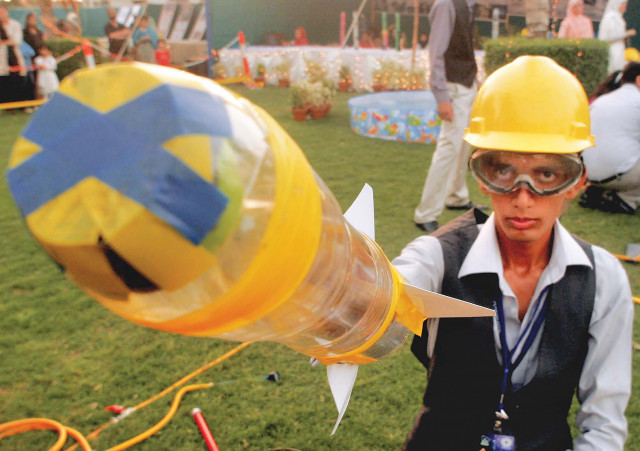World space week ends with a big bang
More than 25 schools participate in events held during the space week, including a rocket-launching competition.

World space week ends with a big bang
The little rocket was followed by Delta 4, Booster Rocket and Serene DPT, all prepared and launched by excited young students on the last day of World Space Week.
Learning about the solar system was made a lot more exciting than flipping through the pages of a book thanks to the space week organised by the Pakistan Space and Upper Atmosphere Research Comission (Suparco).
Sunday was the last day and the participating students were accompanied by their families at the family fair organised as a concluding event at the Suparco headquarters in Gulzar-e-Hijri, off University Road.
Quiz competitions, model making, declamation, poster making and a sky observation show were held to end the week with a final big bang.
A long line formed near the telescope as people waited impatiently for their turn to take a closer look at what lies above.
Jamal, who was too short to reach the eyepiece, was given a leg-up by his father. Amazed at the planets that glittered at the end of the lens, Jamal exclaimed, “There are faraway worlds just like ours!”
“I’m going to be a space explorer and fly in space,” another young visitor, Raza, said happily. According to his mother, the life-defining decision was made only this week. Although the boy had been too young to participate in the competitions, his siblings had taken part in some of the contests and Raza’s interest was kindled. Intrigued by the black hole theory, he could not stop pestering the Suparco representatives with probing questions.
That was the primary aim of the space week, said Zehra Ali, an assistant manager at the Suparco Institute of Technical Training (SIIT). With a gold medal in physics, Ali got into the institute of space studies on merit alone. She believes there is a severe lack of awareness and education in space studies in the country. “More people should come into this field,” she said, adding that Suparco was like “our local NASA”.
At the far end of the ground was the huge space bus that has been an integral part of the week. Seated inside the bus were little students and visitors watching documentaries and films on space, while outside the bus others fidgeted in line for their turn.
This specially-designed bus goes to different schools across Sindh and tries to increase the students’ knowledge about space, said Kiran Zehra, the media coordinator of the event and assistant manager at Suparco.
There were also stalls exhibiting space models and posters. More than 25 schools participated in the events held during the space week, which kicked off on October 4.
The most popular event was the rocket-launching competition, in which rockets designed by school students as well as the SITT students were exhibited. There were rockets with parachutes and there were the more sophisticated automatic rockets as well.
Zubair Arif, one of the engineers who taught students how to make the rockets, told The Express Tribune that a launcher has different names and different styles like the Japanese one with a nozzle and the Thai one without one. They can be made using recycled material such as plastic bottles, acrylic paper and tape.
At the stalls, the students were busy demonstrating the models they had made. Ahsan from the Government Boys Secondary School had constructed a solar system with the help of wires, clay and cardboard in which a bulb shone as the sun. The only student participating from his school, Ahsan said he wants to reach the stars.
Meanwhile, Mehak and Jaweria, class X students from Pak Land School, were a little heartbroken because they had not won any prizes. “All the prizes were given to the private school kids and none to those who presented in Urdu,” they complained. Despite the lack of shiny prizes, the girls were really happy to have attended space week. “Before this we did not even know how many rotations each planet takes around the sun,” Mehak said.
Published in The Express Tribune, October 11th, 2010.












1724319076-0/Untitled-design-(5)1724319076-0-208x130.webp)






COMMENTS
Comments are moderated and generally will be posted if they are on-topic and not abusive.
For more information, please see our Comments FAQ